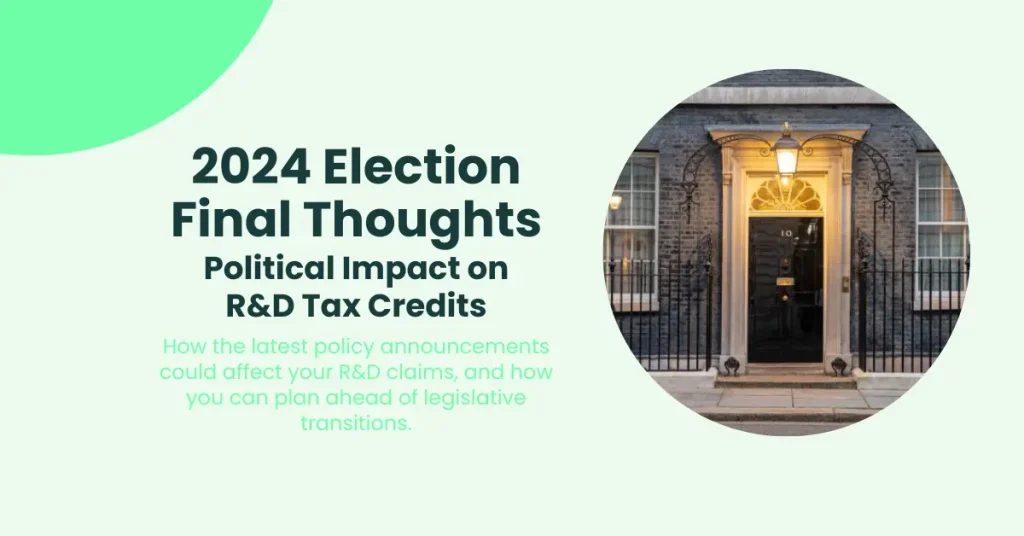2024 Election Final Thoughts: Political Impact on R&D Tax Credits
2 July 2024

What you need to know about the party policies and how the upcoming British general election could impact your R&D tax credits claim.
As the British population prepares to head to the ballots, there remain a number of questions as to how each party’s policies could affect your businesses research and development projects. So to give you a clear insight as to what this election could do for your business, we took a detailed look at each manifesto to give you the most accurate information about potential policy changes in R&D tax credits.
Brief Overview of R&D Tax Credits
First introduced in 2000, R&D tax credits are incentives that encourage businesses to invest in innovative scientific and technological research that enhances their industry. Over the years, they have become a cornerstone of progress in the UK, largely due to the fact that they minimise the financial risk that’s often associated with research and development.
History of R&D Tax Credits in Politics
Being a government funded incentive, politics heavily influences R&D tax credits. This means that changes in leadership or governmental priorities can greatly impact the availability of these credits. Considering these credits historically have a substantial impact on economic growth in the UK, political support for R&D tax credits is typically strong.
So if political support is generally strong, how will the general election impact R&D tax incentives?
General Elections Impact on R&D Tax Credits
In 2024, each party has a somewhat unique approach as to how they plan to continue to support businesses. From aims to further incentivise businesses to policies that will see a reduction in corporate tax, let’s take a look at what the four leading parties had to say about R&D tax credits.
The Conservative Party
Earlier this year, the Tories put into place a merger that would combine two R&D tax credit schemes. This was put together to ensure that all businesses investing in industry related research and development would be able to significantly benefit from the incentive.
In the Conservative Party manifesto, they detailed how they plan to further their support of the initiative while uplifting businesses throughout the UK. The following are the key pledges that the Tories make in regards to R&D tax credits:
- Increase the R&D budget from £20billion to £22billion
- Maintain R&D tax reliefs (especially for SMEs)
- Continue to invest in large-scale compute clusters to improve AI safety and responsibility
The Labour Party
Almost as soon as the British general election was announced, the Labour Party released a series of policy pledges, including an industrial strategy that was aimed at business owners around the UK.
While there is nothing specific about R&D tax credits in this strategy, Labour announced in February 2024 that should they be elected as the majority party this year, they will maintain and stabilise R&D credits with the introduction of a new Regulatory Innovation Office, aimed at improving the accountability of claimants and thus protecting the incentive.
Reform UK
As Reform makes their rise on the political stage, they have been continually vocal about their support for British businesses. This is something that is reflected in their policy pledges, as they dedicate themselves to providing increased support for small and medium-sized enterprises (SMEs).
Although they do not directly mention the concept of R&D tax credits in their manifesto, they do have a pledge that will see fewer SMEs qualifying for R&D tax credits – here’s how.
One of the primary criteria for R&D tax credit eligibility is that the applicant business must be liable to pay corporation tax. Reform UK however made a promise to “lift the minimum profit threshold” in regards to corporation tax, thus alleviating a number of SMEs from having to pay. While this would impact the approach these companies have to research and development, they may still be able to pay for their research and development using money that would otherwise be allocated to their corporation tax.
The Liberal Democrats
Upon the release of the Lib Dems manifesto, the overall objective in regards to UK business is to “develop an industrial strategy that will give businesses certainty and incentivise them to invest in new technologies to grow the economy, create new jobs and tackle the climate crisis”. The key takeaways from this Liberal Democrats statement in relation to R&D tax credits are:
- Increased focus on climate related research and development
- Further investment in innovative research and development
- Potential for an increased R&D tax credits budget
Possible Scenarios and Outcomes
It’s reasonable to assume that a Conservative majority vote wouldn’t instigate much of a change in regards to how you can maximise your R&D tax credits. However, an incumbent party could lead to a range of changes in the coming years. Given the time it takes to write and implement policy, it’s safe to say that the outcome of this election will impact the future of R&D, but changes will likely be rolled out over the course of a few years, so it’s safe to plan ahead.
Strategic Planning for R&D Policy Changes
Changes in party majority could modify how you make a claim, which would require planning for a range of outcomes that could be detrimental to your future R&D claims – specifically if your accounting year is due to begin after July 5th.
Scenario Analysis and Risk Management
Thankfully there are a range of actions you can take in order to prepare for any electoral outcomes. The following are a few of the most helpful:
- Keep an eye on the media and public responses to parties
- Monitor economic business indicators to assess business confidence
- Stay informed and proactive via R&D specialist social media updates
- Evaluate changes to policy and budgets from incumbent parties
The final two points will act as a direct guide as to what you should prepare for both before and after the upcoming general election.
Final Thoughts on Political Impact on R&D Tax Credits
The potential for changes to R&D tax credit policy may be vast, but the overall approach to innovative research and development remains the same. This means that we cannot foresee a future without the initiative, considering its rich history of bringing economic value to the UK.
While the election may be just two days away (at time of publishing), your company could be eligible for an R&D tax credit claim today. Discuss the potential of your research and development projects with one of our experts by filling out the contact form below.







